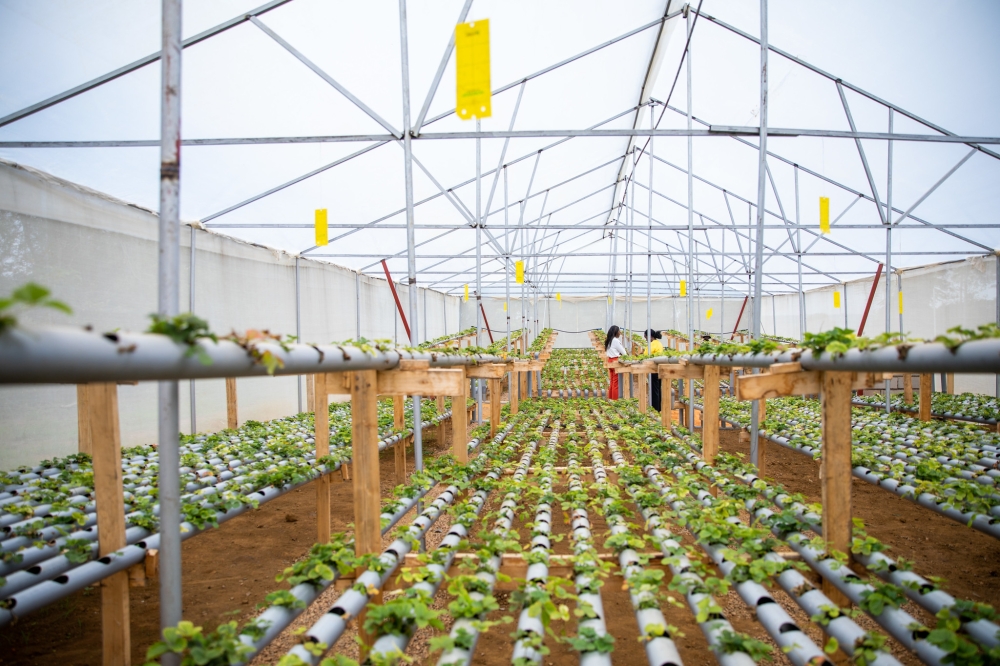

Rwanda has embarked on the implementation of a fund dubbed "Hanga Agritech Innovation Challenge Fund” to support agri-tech entrepreneurs.
The progress about the fund was announced when preparations of the 2nd edition of the African Conference On Agricultural Technologies (ACAT) were being launched on Friday, August 30, in Kigali under the theme: NextGen Ag-Tech Solutions for Africa's Farmers.
The conference will be hosted by Rwanda from June 9 to 13 in 2025.
ALSO: Technology, innovation could unlock Africa’s agriculture potential
The fund which will finance agriculture technologies is among the products that will be launched. Rwanda is making strides in matters of agriculture technology with the launch of the Hanga Agritech Innovation Challenge Fund, a $2 million facility that aims to tackle food challenges and foster innovation in the East African country.
The Fund is set to drive financial and technical support for agriculture technology start-ups,” said Alexandre Rutikanga, the Chief Technical Advisor in the Ministry of Agriculture and Animal Resources (MINAGRI).
The fund was established in collaboration with the ministry of agriculture and animal resources and the World Bank.
ALSO READ: How youth-led innovations can boost agriculture
"We believe that technology has a critical role in steering a vibrant, commercial, and modern agricultural sector that sustainably supports Rwanda’s development, its national aspirations for food security, and longer-term goals including global CAADP and the Sustainable Development Goals commitments,” he said.
The Comprehensive African Agricultural Development Programme (CAADP), is an Agenda 2063 continental initiative that aims to help African countries eliminate hunger and reduce poverty by raising economic growth through agriculture-led development.
Through CAADP, African governments agreed to allocate at least 10% of national budgets to agriculture and rural development, and to achieve agricultural growth rates of at least 6% per annum.
"The finance from the Agritech Innovation Challenge Fund is being channelled through BDF. During the African Food Systems Summit, we will host our grand finale. This is where we will award prizes to the best performers with best ideas and innovative projects,” he said.
Rutikanga said the solutions will involve technologies such as best crop varieties, mechanisation, irrigation, market among others.
"We are at advanced stages. We have over 70 good ideas going through scrutiny and selection,” he said.
The key areas that Rwanda focuses on, he said, include improved food security and strengthening agricultural systems resilience.
"Agriculture is a vital sector of Rwanda's economy, contributing to its growth, poverty reduction, and foreign exchange earnings,” he said.
Eliminating hunger on African continent
The African continent is still facing huge gaps in the development and utilisation of science, technology and innovation (STI) which has been highlighted in different international conversations and debates; specifically, the need to raise the momentum that places technology at the heart of development policy.
ALSO READ: How agricultural biotechnology could boost food security
"African Conference On Agricultural Technologies therefore provides a very timely platform for sector players to discuss and not only make commitments towards addressing these long-term bottlenecks and gaps, but follow-up to ensure implementation,” he added.
The gathering will appraise the progress that Africa has made towards utilisation of innovative technologies and explore opportunities to address challenges affecting technological development, uptake and use, particularly agricultural biotechnology.
According to Canisius Kanangire, Executive Director of African Agricultural Technology Foundation (AATF), the conference is the foremost agriculture technology transfer platform that facilitates structured dialogue and consensus building on game-changing novel agriculture technologies, ideas, and policies to foster agricultural transformation on the continent.
"ACAT 2025 will drive progress in agricultural technology through solution-oriented discussions; inclusive participation; and advancing scientific research,” he said.
Key topics, he said, will feature during discussions at ACAT 2025 which will focus attention on research to develop and deliver agricultural solutions, technology adaptation and adoption.
"There is need to focus attention on ensuring there is a consistent supply and appropriate technology bundling for productive farming especially through seed systems development, effective marketing, distribution and making these technologies competitive and accessible to our farmers and other value chain players,” he said.
The need to implement agricultural technologies responsibly and ethically, with careful management of intellectual property and strengthening collaboration across various stakeholders towards Africa’s agricultural transformation efforts are among key topics.
Genetically modified crops
Kanangire added that although about 15 African countries have approved the trials of genetically modified (GM) crops, only about nine countries including South Africa, Ghana, Nigeria, eSwatini, Malawi, Kenya, Ethiopia, Sudan, and Burkina Faso have fully commercialized GM crops.
ALSO READ: Rwanda to begin GMO trials for potatoes by February 2025
"More concerted efforts are urgently needed to ensure our countries don’t miss out on the GM revolution and that all challenges barring the adoption of these innovative technologies are aptly addressed,” he said.
While technology development has steadily grown, with new advancements introduced through research and partnerships, he noted that, there has been little diffusion of actual products to their intended beneficiaries, especially farmers, entrepreneurs, and consumers.
"This is largely due to persistent bottlenecks that lead to low returns on the large investment in agricultural technology research and development, preventing these products from reaching the market and achieving their intended impact.,” he said.


